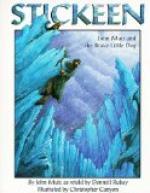Nobody could hope to unravel the lines of his ancestry. In all the wonderfully mixed and varied dog-tribe I never saw any creature very much like him, though in some of his sly, soft, gliding motions and gestures he brought the fox to mind. He was short-legged and bunchy-bodied, and his hair, though smooth, was long and silky and slightly waved, so that when the wind was at his back it ruffled, making him look shaggy. At first sight his only noticeable feature was his fine tail, which was about as airy and shady as a squirrel’s, and was carried curling forward almost to his nose. On closer inspection you might notice his thin sensitive ears, and sharp eyes with cunning tan-spots above them. Mr. Young told me that when the little fellow was a pup about the size of a woodrat he was presented to his wife by an Irish prospector at Sitka, and that on his arrival at Fort Wrangel he was adopted with enthusiasm by the Stickeen Indians as a sort of new good-luck totem, was named “Stickeen” for the tribe, and became a universal favorite; petted, protected, and admired wherever he went, and regarded as a mysterious fountain of wisdom.
On our trip he soon proved himself a queer character—odd, concealed, independent, keeping invincibly quiet, and doing many little puzzling things that piqued my curiosity. As we sailed week after week through the long intricate channels and inlets among the innumerable islands and mountains of the coast, he spent most of the dull days in sluggish ease, motionless, and apparently as unobserving as if in deep sleep. But I discovered that somehow he always knew what was going on. When the Indians were about to shoot at ducks or seals, or when anything along the shore was exciting our attention, he would rest his chin on the edge of the canoe and calmly look out like a dreamy-eyed tourist. And when he heard us talking about making a landing, he immediately roused himself to see what sort of a place we were coming to, and made ready to jump overboard and swim ashore as soon as the canoe neared the beach. Then, with a vigorous shake to get rid of the brine in his hair, he ran into the woods to hunt small game. But though always the first out of the canoe, he was always the last to get into it. When we were ready to start he could never be found, and refused to come to our call. We soon found out, however, that though we could not see him at such times, he saw us, and from the cover of the briers and huckleberry bushes in the fringe of the woods was watching the canoe with wary eye. For as soon as we were fairly off he came trotting down the beach, plunged into the surf, and swam after us, knowing well that we would cease rowing and take him in. When the contrary little vagabond came alongside, he was lifted by the neck, held at arm’s length a moment to drip, and dropped aboard. We tried to cure him of this trick by compelling him to swim a long way, as if we had a mind to abandon him; but this did no good: the longer the swim the better he seemed to like it.




